NOTICE: This post references card features that have changed, expired, or are not currently available
By Julian, author of Devil’s Advocate…
Some people probably think I’m a shill for Google, considering how often I write about Google Flights (see “Bet You Didn’t Know: The Magic of Google Flights” and “Bet You Didn’t Know: Updates on US Airways MC, 1 point xfers & more“). I must admit I’m a big fan of Google Flights. I think it’s one of the best flight search engines out there, faster than almost any other search algorithm and with a great deal (though not all) of the power of its big brother ITA Matrix.
So when I started exploring Google Hotels, which is Google’s companion search engine for finding hotel rooms, I was excited to see what it could do. Unfortunately, the following sentence is the executive summary of my findings…
It ain’t that good.
What’s wrong with Google Hotels?
To be fair, Google Hotels (which is technically called Google Hotel Finder) is what Google terms an “experiment,” which is the same word they’ve used since launching it in 2011. And they’ve improved it in the intervening years, adding international coverage and refining features over time. But it’s still surprisingly sluggish compared to other Google products.
Not only is Google Hotels much less polished than Google Flights, it also suffers from the fact that Google treats the two systems very differently. Google Flights is a (mostly) unbiased and objective search engine that will find the best price that exists anywhere in the world of airfares. Google Hotels, on the other hand, charges OTA’s and hotel chains for booking links and favors those booking links in its results.
So I wouldn’t suggest giving up your favorite hotel search engine just yet. Personally, I prefer Hotels.com. I like their interactive map and the filters you can use with it. I used to like their portal bonuses even more, such as 5 points per dollar spent via Chase Travel℠. Regrettably, most OTA portal bonuses have gone away in recent months, though you can usually still find some cash back sites along with the Barclaycard RewardsBoost portal to get extra OTA savings.
However…
There are two features of Google Hotels that I do find useful and not replicated anywhere else. Unsurprisingly, both of these features rely more on Google’s unmatched knowledge of geography than their hotel search algorithm. But they’re especially helpful when you’re researching places to stay in a new and unfamiliar city.
Feature #1: Descriptive and specific location filters.
When you start exploring hotels in a city you haven’t visited before, many OTA search engines try to help by offering to filter results to a specific area of town. For instance, if you’re looking for hotels in London, Hotels.com will suggest a list of landmarks and tube stations you can use to narrow down your search.
The problem is if you don’t know anything about London, then this list isn’t terribly useful. Is the London Eye a good place to stay? What’s the Hyde Park area like? What attractions will you find in Trafalgar Square (angry Trafalgars, maybe?) If you don’t know London, then you don’t know.
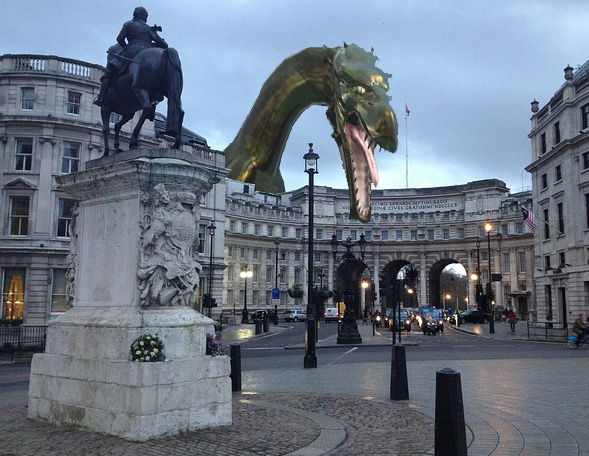
Obviously you could do research elsewhere on the web to find out, but this is one area where Google Hotels makes things faster and easier. Go to Google Hotels (it’s at http://www.google.com/hotelfinder) and search for the city you’re visiting along with your dates of travel.
As with most OTA’s, Google Hotels offers a number of filtering options, including price, hotel class, and user rating. But it’s their “Location” option that’s most useful, because it not only gives us a list of major areas in the city, it describes each one in detail and uses Google Maps to define the area with specific boundaries.
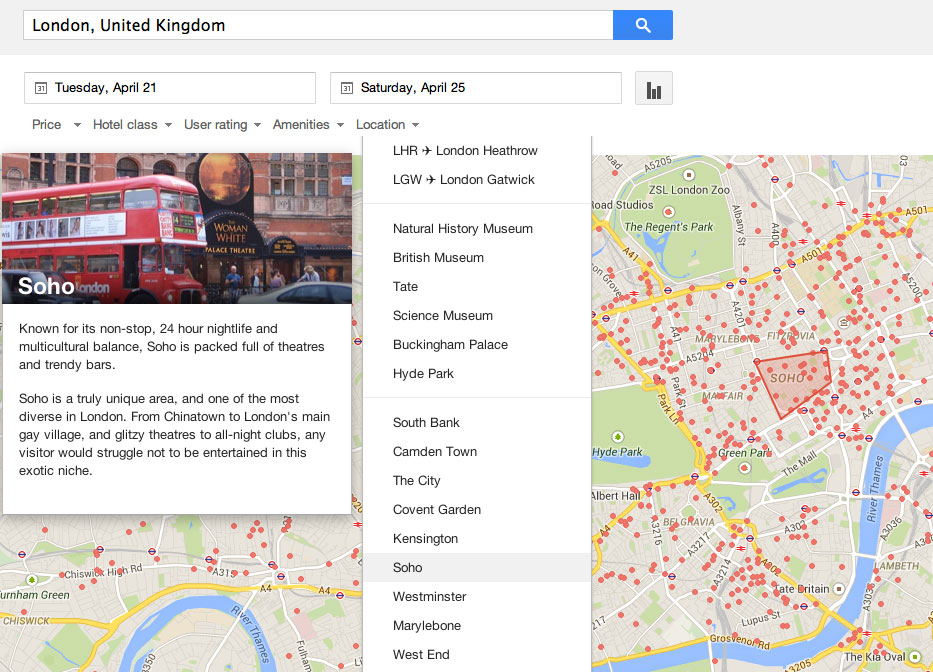
Each red dot is an individual hotel — click on a dot and you’ll get a description of that property, along with a price for your travel dates. Again, I’d recommend using an OTA or hotel website for the best pricing, but this will tell you which hotels to look for.
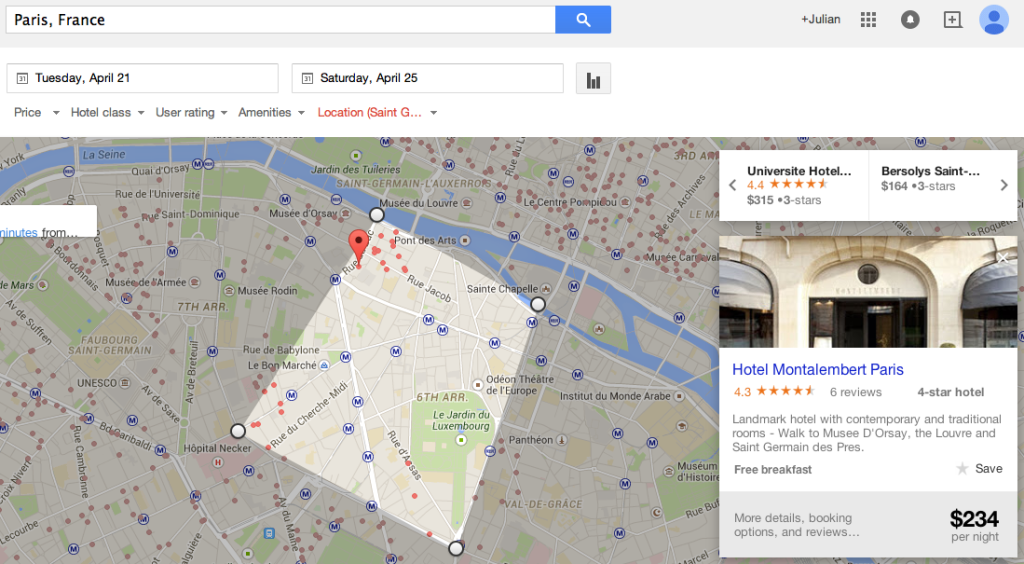
Google Hotels has location info for a number of major international destinations, though it appears to be stronger in Europe and much weaker in Asia. I assume as time goes on, this detailed info will be added to more and more cities. The information also seems relatively accurate — when checking my home city of Los Angeles, Google Hotels correctly notes (in a shock to tourists everywhere) that Studio City does not contain any actual movie studios.
Feature #2: The mass transit tie-in.
From the map view, there’s another Google Hotels feature that I particularly like. Search for a landmark or an address, then click on the “Show hotels 15 minutes from…” link in the upper left corner and Google Hotels will give you the option to highlight hotels within a specific driving, walking, or mass transit distance.
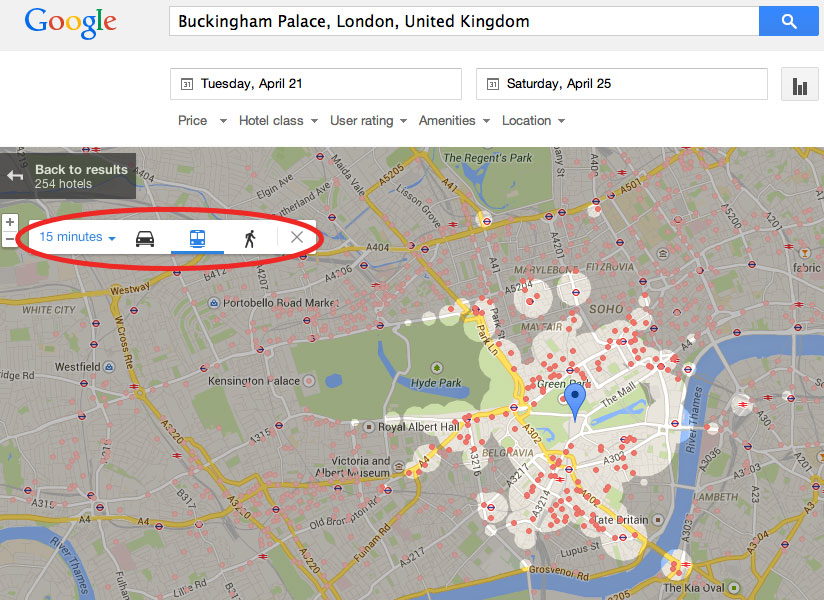
The mass transit option is the one I think is the neatest. Google takes into account the stops and stations on the various nearby bus or train lines and how much additional time it takes to walk from your hotel to those stops, so it’ll highlight increasingly smaller circles around those stations as you get further away from your destination.
You can choose anywhere between 5 and 60 minutes for this search function by clicking on the blue “15 minutes” text, and again, any red dot in the highlighted areas is a hotel that can be selected for more detail.
All of this info can be found elsewhere on the web, but Google Hotels does a fairly decent job of tying it together in one place, which of course is Google’s specialty. I just wish the rest of Google Hotels was as useful as these two features. If they ever refine Google Hotels to the point that it’s comparable to Google Flights, then it’ll become a major tool in my toolbox. But in the meantime, I’ll only use Google Hotels for these limited research functions and stick with my other options for actual hotel bookings.
Other Recent Posts From The “Bet You Didn’t Know” Series:
Mistake Fares Exclusively For Your City or Airline
A Toolkit for Chasing Mistake Fares
3 Ways to Earn the Most Points at Disney
Find all the “Bet You Didn’t Know” posts here.


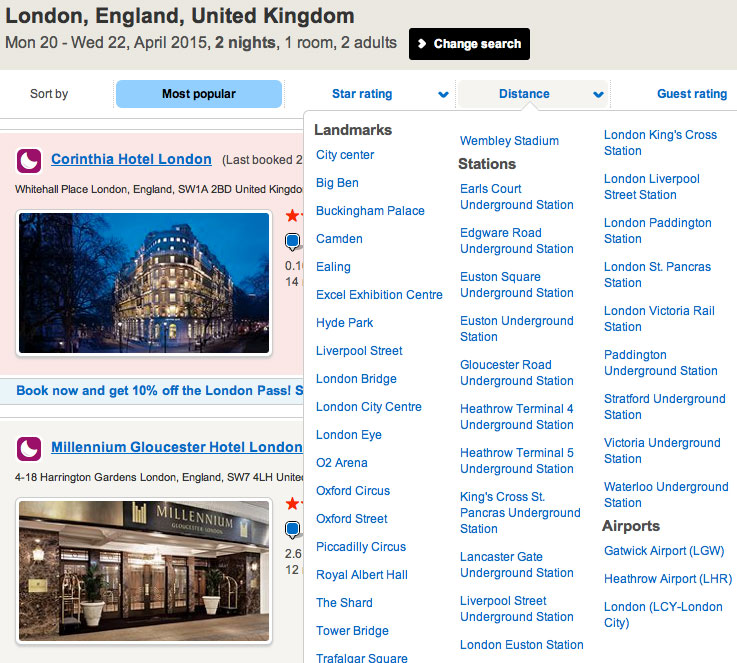
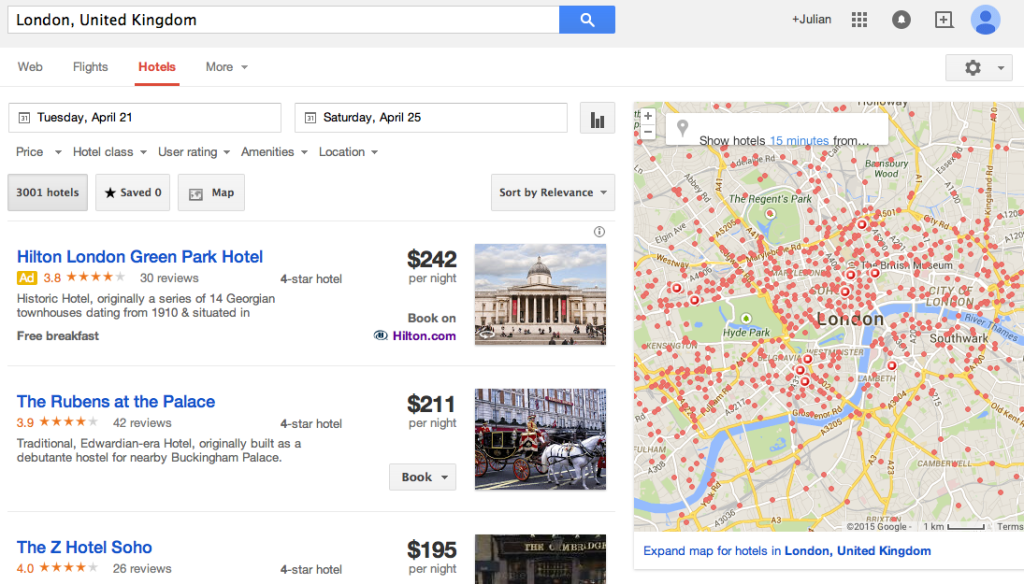
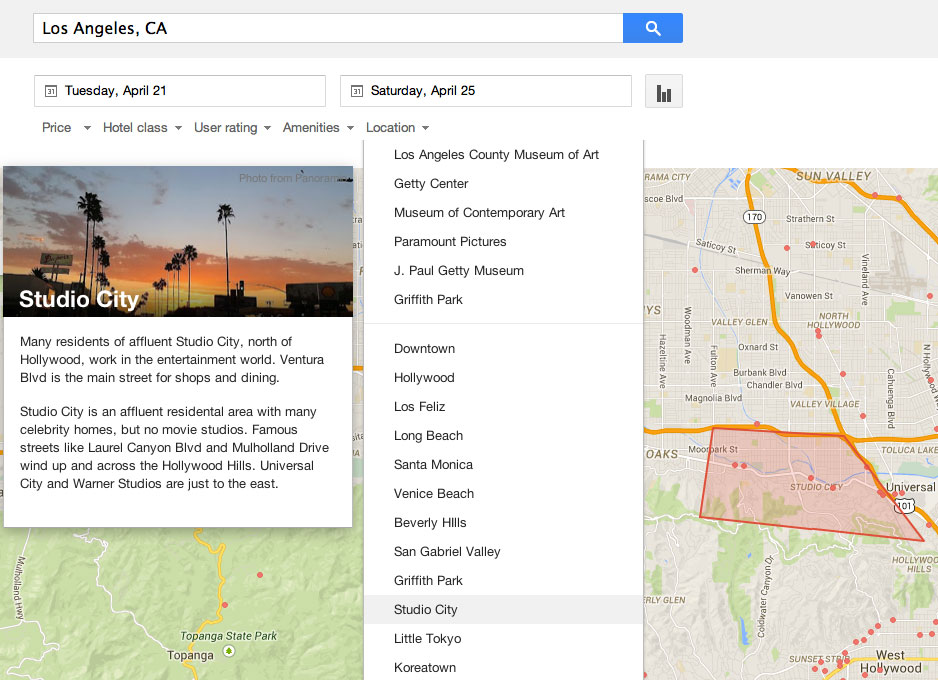


[…] The (only) two useful features of Google Hotels […]
Great post with very practical info as always France from the FM crew
[…] Bet You Didn’t Know: The (only) two useful features of Google Hotels (The Frequent Miler). I like being able to drag to a specific area, didn’t know about the way to incorporate public transport. […]
I’ve often just zoomed in on an area in Google maps and typed “hotel” in the search box. This is much more efficient, especially the transit option. Of course, they have to have up to date transit info in your area…
That’s definitely another good way to show the hotels in a given area, but it only helps if you already know about that particular city and the neighborhoods in it. Also, while you can see the various transit lines with that method (which is nice), it doesn’t highlight a group of hotels by the time it takes to get there.